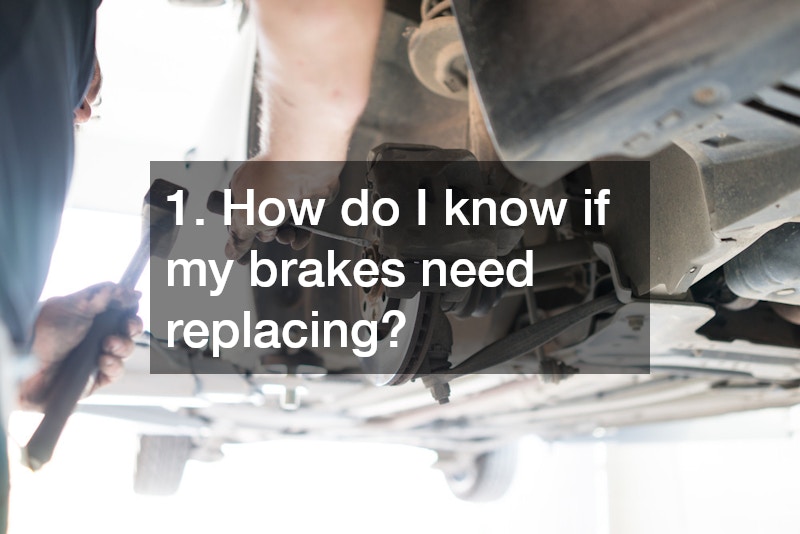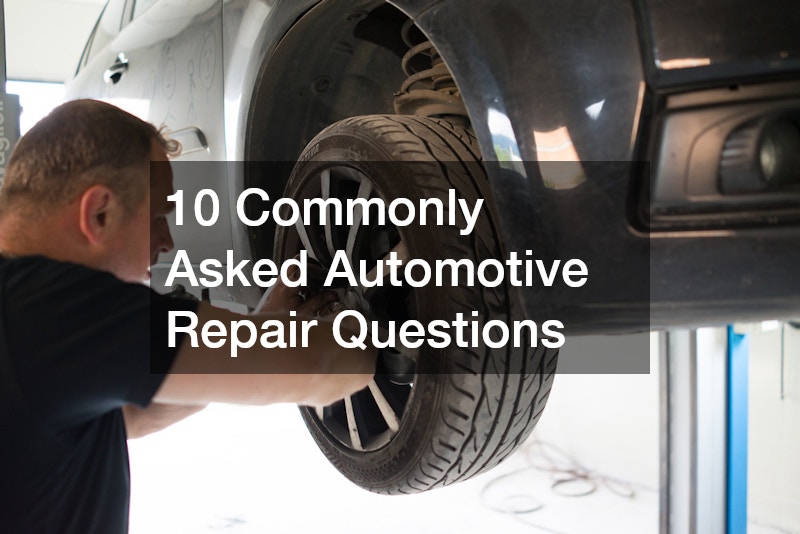
If you’ve ever found yourself stuck on the side of the road with a broken-down car, or if you’ve ever wondered how to maintain and repair your vehicle properly, you’re not alone. Car troubles can be incredibly frustrating and confusing, especially if you don’t know where to turn for help. The reality is that vehicles are complex machines, and without the right knowledge, even minor issues can turn into costly repairs. That’s why we’ve created this comprehensive guide to the ten most commonly asked automotive repair questions. Whether you’re concerned about your brakes, transmission, or even the strange noises your car seems to be making, we’ve got you covered with expert advice on each topic.
From routine maintenance tips to troubleshooting unexpected breakdowns, this guide aims to provide clear and practical solutions. We understand that not everyone is a mechanic, so we’ve made sure to break down technical concepts in a way that’s easy to understand. Read on to discover important information that can save you time, money, and stress while keeping your vehicle running smoothly.
1. How Do I Know If My Brakes Need Replacing?

Regular brake maintenance is crucial for vehicle safety and should not be neglected. Common signs that your brakes may need replacing include squealing or grinding noises, a spongy brake pedal, or a longer stopping distance than usual. It’s crucial to consult a trusted mechanic or a roadside assistance service to assess the condition of your brakes and ensure your safety on the road.
Scheduling regular check-ups can help you identify issues with your brakes before they escalate into more significant problems. Your mechanic will check the thickness of your brake pads, the condition of your rotors, and the fluid levels in your brake lines. If you notice any warning signs, it’s best to act promptly to avoid expensive repairs and potentially hazardous situations.
Ignoring brake problems can lead to failure, resulting in dangerous situations both for you and other road users. Being proactive about brake maintenance helps prevent accidents, reduce repair costs, and enhance your vehicle’s overall performance. Utilizing local auto repairs regularly can also help maintain this aspect of your vehicle.
2. What Are the Signs of a Bad Transmission?
Transmission issues can make driving difficult and hazardous, and identifying the signs early can save you from costly repairs. Common signs include slipping gears, delayed or harsh shifts, and an illuminated check engine light. If you experience any of these symptoms, consider consulting a professional for transmission repair services to prevent further damage.
A malfunctioning transmission can reduce your vehicle’s efficiency, making it necessary to visit a transmission repair specialist. They can perform diagnostic tests to identify the problem and recommend the best course of action, whether it involves a simple fluid change or a complete transmission overhaul. Being proactive about transmission care can ultimately extend your vehicle’s lifespan and reliability.
Regular maintenance is the key to keeping transmission issues at bay. Consider having your transmission serviced regularly, and always use the recommended type of transmission fluid for your vehicle. Routine check-ups and consulting with experts in local auto repairs can help keep your gearbox operating smoothly, enhancing your driving experience.
3. What Do I Do If My Car Won’t Start?
A car that won’t start can be frustrating, especially if you’re in a hurry. Common culprits include a dead battery, faulty starter, or fuel-related issues. In such situations, it’s beneficial to have the number of a reliable local towing company at hand to get you the assistance you need.
Before jumping to conclusions, perform a basic check: ensure your battery terminals are clean and secure, and listen for any clicking sounds when trying to start the car. If these checks don’t solve the issue, professional help might be needed to diagnose and fix more complex problems. Local auto repairs can be your go-to for a quick and efficient diagnosis.
Being prepared with appropriate tools and contact numbers, like roadside assistance services, can greatly reduce the stress of a no-start condition. Regular battery checks and maintenance also play a crucial role in preventing such issues from arising unexpectedly. If your car remains stubborn, consult professionals to address potential starter or alternator issues.
4. How Do I Deal With Strange Noises Coming From My Car?

Unusual noises are often a vehicle’s way of signaling that something might be wrong. Rattles, squeals, or grinding sounds could indicate a variety of issues, from worn brake pads to exhaust system leaks. Addressing these problems may require the expertise of a recreational vehicle repair professional, especially if your vehicle is used for off-road adventures.
Identify where the noise is coming from; is it under the hood, towards the back, or beneath the vehicle? This will help narrow down potential issues, allowing you to communicate more effectively with your mechanic. Regular inspections and timely repairs can prevent minor issues from becoming costly repairs.
Consistent upkeep and awareness of your vehicle’s condition are essential for smooth operation. Keeping detailed records of repairs and maintenance can be valuable, helping you stay on top of impending issues and seek the appropriate automotive repair questions. A local auto repair service can be your partner in maintaining a healthy vehicle and troubleshooting weird sounds before they escalate.
5. How Can I Improve My Vehicle’s Fuel Efficiency?
Fuel efficiency is a major concern for many drivers seeking to reduce their environmental impact and save money. Ensuring that your vehicle’s fuel tanks are functioning optimally is crucial for achieving good mileage. Regular maintenance, such as tuning the engine, checking tire pressure, and using high-quality fuel, can significantly enhance your vehicle’s fuel economy.
Another aspect to consider is weight management; carrying excessive loads in your car can drastically lower fuel efficiency. Lightening the load by removing unnecessary items and properly using truck bed covers can make a noticeable difference in fuel consumption. Consider using fuel-efficient driving techniques, such as gradual acceleration and maintaining steady speeds, to further optimize your car’s fuel usage.
The integration of trailer hitches or modifications might also impact fuel efficiency. Being mindful of how these additions affect your vehicle’s aerodynamics and weight distribution can guide your choices toward more fuel-efficient setups. Incorporate regular engine diagnostics into your maintenance routine to keep your vehicle operating at its peak.
6. What Should I Check If My Car Is Overheating?
Overheating can cause serious damage to your vehicle’s engine if not addressed promptly. Common causes include low coolant levels, a faulty thermostat, or a leaking radiator. Checking these components regularly and addressing any discrepancies can prevent an overheating situation from occurring.
If your car begins to overheat while driving, safely pull over and turn off the engine to avoid exacerbating the problem. Allow your vehicle to cool down, and check the coolant levels once it’s safe to do so. If the coolant is low, refill it and monitor for potential leaks, consulting automotive repair professionals where necessary.
Regularly inspecting your vehicle’s cooling system, including the radiator and hoses, can help identify potential issues before they lead to overheating. Working with a service that specializes in trailer hitches and recreational vehicle repair may provide insights into maintaining various vehicle systems, ensuring reliable performance on and off the road.
7. What Should I Do if My Car Won’t Start?

This section seems to be a repeat of a previous query. However, addressing a non-starting vehicle again could emphasize different aspects of the problem. If your car won’t start, it’s wise to first ensure that your battery is fully charged and inspect the connections for corrosion. Additionally, verify that your fuel tanks are topped off and the fuel pump is operating correctly.
Beyond basic checks, consider how external factors might affect your vehicle. Cold weather has been known to hinder starting capabilities by thickening engine oil or affecting battery performance. If these issues are recurrent, consulting with local auto repairs may help in identifying the root cause and preventing future occurrences.
Ultimately, preventative measures such as maintaining a proper schedule for oil changes, inspecting the truck bed covers, and servicing your ignition system can make a world of difference. Documenting your vehicle’s behavior during these situations gives mechanics the insight needed to address the problem accurately.
8. How Does Tire Maintenance Affect Car Performance?
Tires are crucial to vehicle performance, affecting everything from fuel efficiency to safety. Ensuring that your tires are properly inflated and aligned optimizes fuel consumption and enhances driving stability. Apart from these basics, regular rotations and inspections protect against uneven wear, creating a smoother ride.
Visibility of tire tread depth and overall tire condition should be regularly monitored. An independent parking lot paving services inspection can complement regular maintenance checks by pinpointing potential road hazards you might overlook. Using high-quality tires tailored for your specific vehicle type guarantees enhanced performance and safety.
Investment in good tires is invaluable, preventing accidents caused by skidding or poor traction. Regular visits to a tire specialist within your local towing company network ensure professional guidance and service, maintaining the highest mileage and reliability from your set of tires.
9. When Is It Better to Repair vs. Replace a Part?
Distinguishing between when to repair or replace car parts can significantly impact your maintenance budget. A minor issue might escalate into major problems if ignored, so making prompt decisions is essential. Garner advice from credible local auto repairs to weigh the benefits of affordable repairs against potentially costly replacements.
Determining the best course of action depends on various factors, including cost, part availability, and potential impact on the vehicle’s performance. It’s essential to consult mechanics versed in your vehicle make and model, considering any warranty implications as part of your decision-making process.
On occasion, replacing key components, especially after extended use, is more beneficial in the long term. Regular diagnostics and opinions from trustworthy repair professionals can provide clarity, ensuring that whether you’re fixing a small issue or opting for a complete replacement, it aligns with your vehicle’s best interests.
10. When Is It Time to Get Rid of Your Car?

Deciding to part with your vehicle can be a difficult choice, often influenced by the condition, age, and cost of repairs. Consider consulting ‘ we buy junk cars‘ services for evaluations that give an honest assessment of your vehicle’s roadworthiness. Regular maintenance observations inform you about its usability and reliability, helping you weigh the pros and cons.
Financial aspects also play a crucial role. Continuous repairs can sometimes outweigh the vehicle’s value, making it more economical to invest in a newer model. Consulting automotive industry professionals for resale value and potential resale options may further aid the decision-making process.
